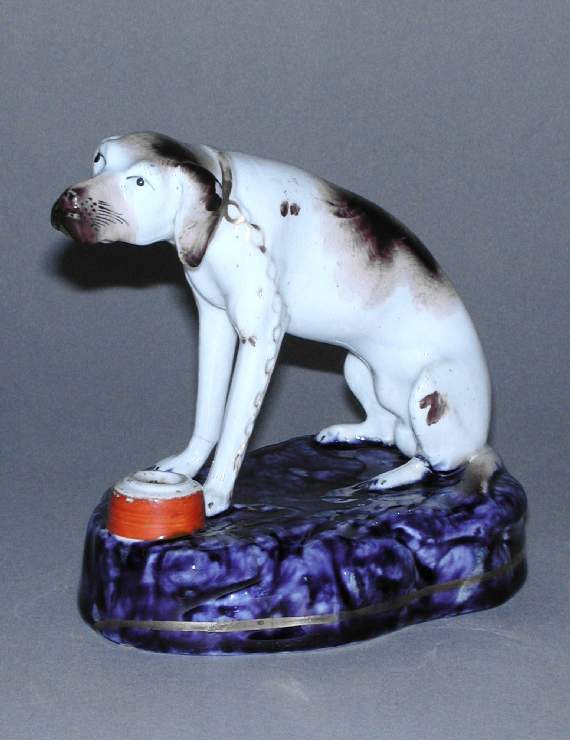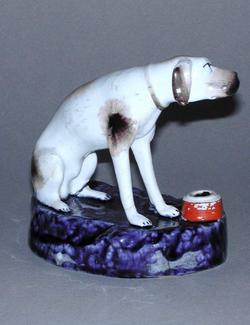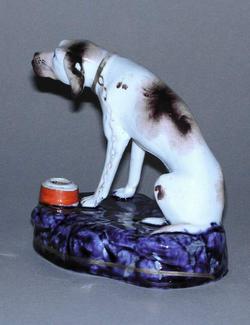Current Location: In storage
Titles
Dog and bowl
Maker(s)
Production:
James Dudson
(Perhaps)
Entities
Categories
Description
White earthenware animal figure, moulded in-the-round in several parts and lead-glazed. Painted in under-glaze blue and in black, orange and brown enamels and gilt.
The dog sits, facing left, its neck outstretched. Below its chin, a circular moulded dog bowl standing on the base doubles as both ink-well and vent hole. The dog is white with brown patches, and wears a gilt collar and chain, which runs down its left foreleg. Its eyes and whiskers are finely painted in black; its claws are touched in in under-glaze blue. The figure is well coloured. The base, a rough oval, is a deep but uneven blue; a gilt line runs across the front, its ends dipping towards the bottom. The underside is concave and glazed.
Notes
History note: Fenton and Sons, 11 New Oxford Street, London. Bought with two other pieces on 27 February 27 1915, for £20, by Dr Glaisher, Trinity College, Cambridge. Dr Glaisher considered the purchase value of this piece to be 16/- (sixteen shillings).
Legal notes
Dr. J.W.L. Glaisher Bequest, 1928
Measurements and weight
Depth: 7.5 cm
Depth: 3 in
Depth: 4.25 in
Height: 10.5 cm
Height: 4.125 in
Width: 11 cm
Acquisition and important dates
Method of acquisition: Bequeathed
(1928)
by
Glaisher, J. W. L., Dr
Dating
19th Century, Mid
Victorian
Circa
1840
CE
-
Circa
1850
CE
Note
Dr Glaisher generally only bought Victorian Staffordshire figures which represented a known person or place, or which could be dated. But, on purchasing this and another figure of a dog, he notes: ‘In both the base is of a bright blue, not uniform but shaded and very dark in places […]I think this dark blue first came into use about 1830 and rather distinguishes the period 1830-1845. The modelling in both is good […]. I always feel rather interested in the animals which serve also as ink stands’.
Rackham (1935) lists this figure as of a type made chiefly by Sampson Smith at Longton, a factory listed in contemporary directories as a ‘manufacturer of figures in great variety’, which began around 1851. But this figure is moulded in the round, so was probably made in the 1840s. The Dudson factory at Hanley produced many animal figures, particularly dogs, at this time. These were often on bases painted underglaze in a rich cobalt blue and with a gilt line across the front. The fine painting of the dog’s face, with the whiskers delicately painted and the eyes moulded with a dot at the centre and a fine black line above, also suggests that this is a Dudson figure. Dudson ledgers of 1842-44 show that dogs were made, both as pairs and inkwells, and that setters, for example, sold wholesale at 5/- (five shillings) a dozen (Dudson (2006), p.131).
School or Style
Victorian
Components of the work
Decoration
composed of
enamels
( black, orange and brown)
underglaze cobalt-blue
Materials used in production
White earthenware
Lead-glaze
Gold
Techniques used in production
Press moulding
: White earthenware, moulded in-the-round in several parts and lead-glazed. Painted in under-glaze blue and in black, orange and brown enamels and gilt. The underside is concave and glazed.
Painting
Lead-glazing
Gilding
Inscription or legends present
Inscription present: Rectangular paper label, handwritten in black script
- Text: No.3912. White dog with brown spots seated on a blue base, forming an ink-stand b. in London Feb 27 1915
- Location: Underside of base
- Method of creation: Handwritten in black ink
- Type: Label
References and bibliographic entries
Identification numbers
Accession number: C.1006-1928
Primary reference Number: 71126
Old object number: 3912
Stable URI
Audit data
Created: Saturday 6 August 2011
Updated: Tuesday 30 April 2024
Last processed: Thursday 14 August 2025
Associated departments & institutions
Owner or interested party:
The Fitzwilliam Museum
Associated department:
Applied Arts






